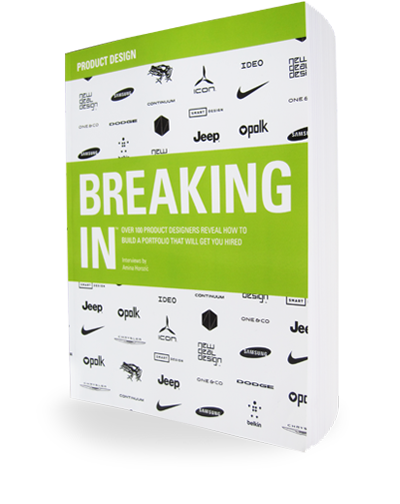Check out some great work from ECCO Design.
What kinds of portfolios get your attention these days? What brings in an industrial designer for an interview?
You need to have a good portfolio with skill and sensitivity about form, about design, and more importantly now, the humanity. Design is for human beings and we need to make sure that people can use the object we design. I think design used to be only about the aesthetics, but nowadays there are a lot of challenges in the world. There are all sorts of issues like the energy impact, ecology, material choice, recyclability. Everything needs to be beautiful, useful, affordable and needs to perform, but that alone is not good enough.
[ … ]
How would you say that affects the content of portfolios? What should students be focusing on, or how should they be presenting their work to reflect these changes?
I think a designer needs to know the background, research and understand how the product will be used, and what the content should be. Research skills are a very important piece and the student needs to show a logical understanding of their problem. At the end of the day, it’s down to the designer’s sensitivity, or the magic touch, that pulls all of those forms together to make a desirable object that is long-lasting and that people can use. That design skill is not only aesthetic or technical, but also psychological, cultural, and intellectual.
Have you seen a portfolio recently that embodied that, and can you share what about it stood out?
You can see from the project how the student has expressed themselves. Design is still in a commercial environment and we really need to meet the objectives of a market success. Many of the portfolios we see are more focused on that area, which is not necessarily bad. But if you think long term, and see how the designers understand and describe their mission and their goals, you can see beyond the portfolio. When they interview, you can see and hear from the person as to how they think, how their design relates to the culture.
What else do you expect to learn from them during the interview?
We would like to know the person’s integrity, and their values. Can they work with a team? How do they communicate their own ideas and express themselves? When we look for young people, we are looking for long-term prospects. We look for those who can work as a team over a long time.
[ … ]
If you were just starting now, what advice would you give yourself?
I would definitely tell the younger me to take more risks. Do more things that seem risky. Read more and learn more outside of the design field. It’s a very different world now, the young people have a lot more opportunities and are not as confined as how we used to be. That’s also a new challenge—noise is everywhere. Information and noise and insight are different. How can we get to actionable insights that we can use to make better societies or better ourselves?
[ … ]

Eric Chan of ECCO Design

Comments are closed.